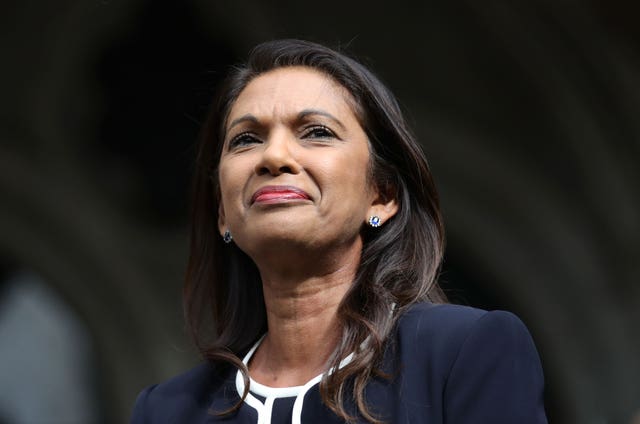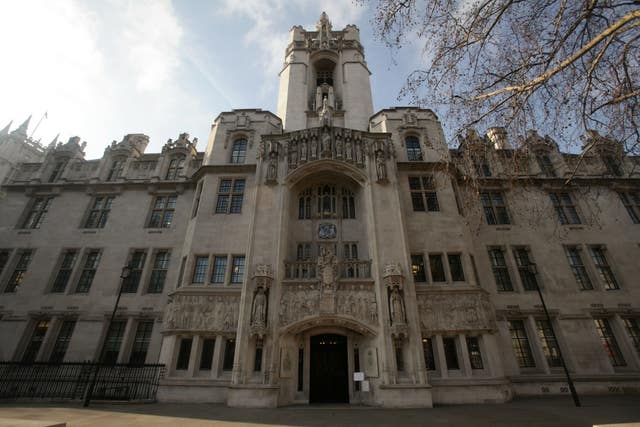
A legal battle over Prime Minister Boris Johnson’s controversial decision to suspend Parliament for five weeks is set to be heard by the UK’s highest court.
The Supreme Court in London will hear appeals from two separate challenges brought in England and Scotland to the prorogation of Parliament over three days, starting on Tuesday.
Mr Johnson says the five-week suspension is to allow the Government to set out a new legislative agenda in a Queen’s Speech when MPs return to Parliament on October 14.
But those who brought legal challenges against the Prime Minister’s decision argue the prorogation is designed to prevent parliamentary scrutiny of the UK’s impending exit from the EU on October 31.
The Supreme Court, which will sit as a panel of 11 justices for only the second time in its 10-year history, must reconcile contradictory judgments issued by the English and Scottish courts.
 Gina Miller (Aaron Chown/PA)
Gina Miller (Aaron Chown/PA)
The High Court in London dismissed the case brought by businesswoman and campaigner Gina Miller – who previously brought a successful legal challenge against the Government over the triggering of the Article 50 process to start the Brexit countdown – finding that the length of the prorogation was “purely political”.
Giving reasons for their ruling on September 11, three judges said: “We concluded that the decision of the Prime Minister was not justiciable (capable of challenge). It is not a matter for the courts.”
However, the Inner House of the Court of Session in Edinburgh ruled that Mr Johnson’s decision was unlawful because “it was motivated by the improper purpose of stymying Parliament”.
Lord Carloway, Scotland’s most senior judge, said: “The circumstances demonstrate that the true reason for the prorogation is to reduce the time available for parliamentary scrutiny of Brexit at a time when such scrutiny would appear to be a matter of considerable importance, given the issues at stake.”
Following that ruling, a Downing Street source suggested the MPs and peers who brought the legal challenge “chose the Scottish courts for a reason” – prompting criticism from Scottish First Minister Nicola Sturgeon, who branded the comments “deeply dangerous”, as well as Justice Secretary Robert Buckland.
Mrs Miller’s challenge was supported by former prime minister Sir John Major, shadow attorney general Baroness Chakrabarti and the Scottish and Welsh governments, who are all interveners in the Supreme Court case.
A cross-party group of around 75 MPs and peers, led by SNP MP Joanna Cherry QC, was responsible for the Scottish challenge and the appeal against the Court of Session’s decision is being brought by the Advocate General for Scotland, on behalf of the Westminster Government.
Victims’ campaigner Raymond McCord – who brought separate proceedings in Belfast, arguing that a no-deal Brexit would damage the Northern Ireland peace process – has also been given permission to intervene in the Supreme Court case.
 The Supreme Court (Yui Mok/PA)
The Supreme Court (Yui Mok/PA)
In a statement ahead of the hearing, Mrs Miller said: “As with my first case, my Supreme Court case is about pushing back against what is clearly a dramatic overreach of executive power.
“This is an issue that cuts across the political divides – and the arguments about the EU – and it has united remainers and leavers and people of all political complexions and none in opposition to it.
“The precedent Mr Johnson will set – if this is allowed to stand – is terrifying: any prime minister trying to push through a policy that is unpopular in the House and in the country at large would from now on simply be able to resort to prorogation.
“No one could ever have envisaged it being used in this way: this is a classic power-grab.”

She added: “The reason given for the prorogation was patently untrue and, since then, the refusal to come clean or provide any of the disclosures we have asked for has compounded the deception.
“It is my view – and the view of a great many others – that Mr Johnson has gone too far and put our parliamentary sovereignty and democracy in grave danger by his actions.”
Mr Johnson advised the Queen on August 28 to prorogue Parliament for five weeks from the week of September 9.
The Supreme Court judges will hear submissions from the parties and interveners from Tuesday to Thursday, but it is not clear when they will give a ruling.



Why are you making commenting on The Herald only available to subscribers?
It should have been a safe space for informed debate, somewhere for readers to discuss issues around the biggest stories of the day, but all too often the below the line comments on most websites have become bogged down by off-topic discussions and abuse.
heraldscotland.com is tackling this problem by allowing only subscribers to comment.
We are doing this to improve the experience for our loyal readers and we believe it will reduce the ability of trolls and troublemakers, who occasionally find their way onto our site, to abuse our journalists and readers. We also hope it will help the comments section fulfil its promise as a part of Scotland's conversation with itself.
We are lucky at The Herald. We are read by an informed, educated readership who can add their knowledge and insights to our stories.
That is invaluable.
We are making the subscriber-only change to support our valued readers, who tell us they don't want the site cluttered up with irrelevant comments, untruths and abuse.
In the past, the journalist’s job was to collect and distribute information to the audience. Technology means that readers can shape a discussion. We look forward to hearing from you on heraldscotland.com
Comments & Moderation
Readers’ comments: You are personally liable for the content of any comments you upload to this website, so please act responsibly. We do not pre-moderate or monitor readers’ comments appearing on our websites, but we do post-moderate in response to complaints we receive or otherwise when a potential problem comes to our attention. You can make a complaint by using the ‘report this post’ link . We may then apply our discretion under the user terms to amend or delete comments.
Post moderation is undertaken full-time 9am-6pm on weekdays, and on a part-time basis outwith those hours.
Read the rules hereLast Updated:
Report this comment Cancel